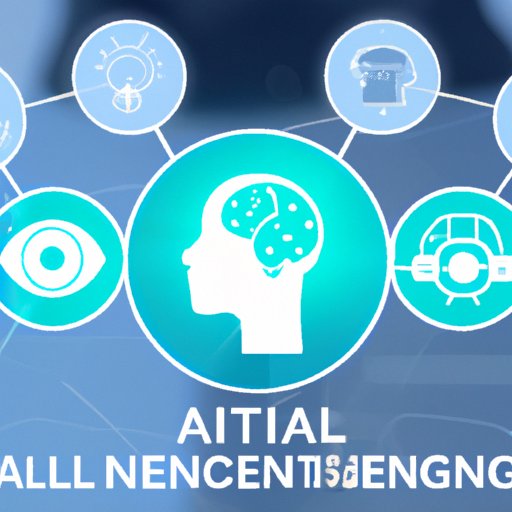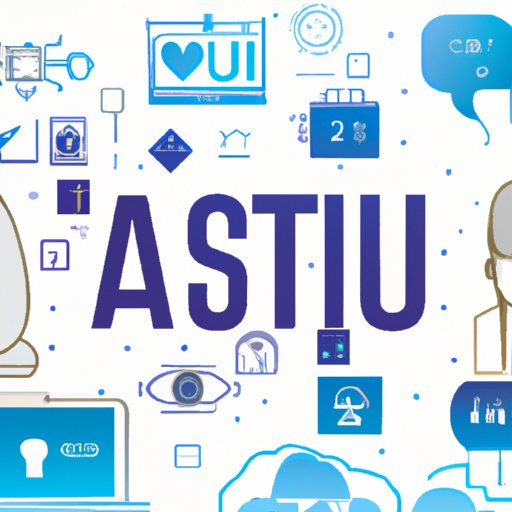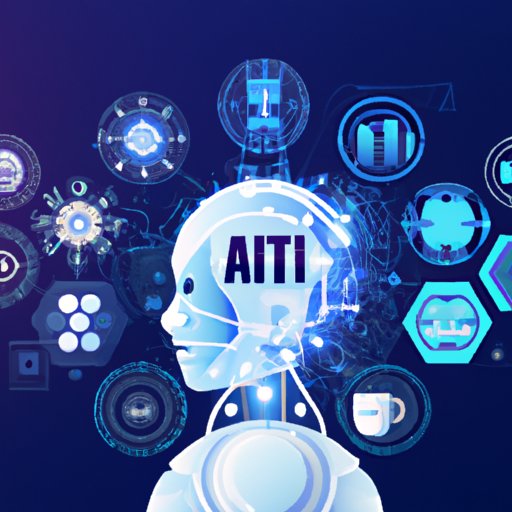Introduction
Artificial intelligence (AI) technology has been around for decades, but today it is one of the most talked-about topics in the tech world. AI technology has the potential to revolutionize the way we work and live, from automated systems to smarter services. But what exactly is AI technology, and how does it work? In this article, we will explore the definition of AI technology, its various forms, and its implications for business and everyday life. We will also look at the benefits and challenges associated with AI technology, and discuss the future of AI in terms of machine learning, natural language processing, robotics, and quantum computing.
Exploring AI Technology: What is AI and How Does it Work?
At its core, AI technology is a type of computer technology that is designed to mimic human behavior. AI technology is used to create intelligent machines that can “think” and make decisions based on the data they receive. AI technology is often referred to as “machine learning” because it enables machines to learn from their experiences and improve their performance over time.
The term “artificial intelligence” was first coined in 1956 by John McCarthy, a computer scientist who defined it as “the science and engineering of making intelligent machines.” AI technology is based on the idea that machines can be taught to think like humans, or even better than humans, by using algorithms that allow them to recognize patterns, draw conclusions, and make decisions. AI technology can be used to solve problems that are too complex for humans to solve on their own.
There are several different types of AI technology, including supervised learning, unsupervised learning, and reinforcement learning. Supervised learning involves providing a machine with labeled data and teaching it to recognize patterns and identify correlations between different variables. Unsupervised learning involves feeding the machine raw data and allowing it to find patterns and correlations without any guidance. Reinforcement learning is a type of AI technology that uses rewards and punishments to teach a machine to make decisions.
AI technology is also used in a variety of applications, from facial recognition systems to self-driving cars. AI technology is used in smart appliances to make them more efficient, and in healthcare to diagnose diseases and recommend treatments. AI technology is also being used in finance to automate transactions and in marketing to personalize customer experiences.
The Impact of AI Technology on Businesses
AI technology has the potential to revolutionize the way businesses operate. Automation is the key component of AI technology, and it can help businesses streamline processes and reduce costs. By automating tasks such as customer service, data entry, and inventory management, businesses can reduce labor costs and increase efficiency. AI technology can also be used to analyze customer data and provide insights into customer behavior, which can help businesses make more informed decisions.
AI technology can also help businesses increase productivity by automating repetitive tasks and freeing up employees to focus on higher-value work. According to research conducted by McKinsey & Company, AI technology could potentially increase global productivity by 0.8 to 1.4 percent annually. Additionally, AI technology can help businesses make better decisions by analyzing large amounts of data faster and more accurately than humans.

Understanding the Benefits and Challenges of AI Technology
The use of AI technology comes with both benefits and challenges. On the one hand, AI technology can help businesses automate processes, reduce costs, and increase productivity. Additionally, AI technology can help businesses make better decisions by analyzing large amounts of data faster and more accurately than humans. On the other hand, AI technology raises ethical and privacy concerns, as well as the potential for job displacement.
One of the biggest benefits of AI technology is its ability to automate processes and free up employees to focus on higher-value work. Automation can help businesses reduce costs, increase efficiency, and improve customer service. Additionally, AI technology can help businesses make better decisions by analyzing large amounts of data faster and more accurately than humans.
However, there are some challenges associated with AI technology. For example, AI technology raises ethical and privacy concerns, as well as the potential for job displacement. Additionally, AI technology can be expensive to implement and maintain, and it requires a high level of technical expertise to use effectively.

AI Technology in Everyday Life: An Overview
AI technology is becoming increasingly prevalent in our everyday lives. AI technology is used in smartphones to enable voice commands and facial recognition, in autonomous vehicles to detect obstacles and navigate safely, and in healthcare to diagnose diseases and recommend treatments. AI technology is also being used in marketing to personalize customer experiences and in finance to automate transactions.
AI technology is also being used in a variety of consumer products, such as virtual assistants and smart home devices. Virtual assistants, such as Amazon’s Alexa and Google Assistant, use AI technology to understand voice commands and respond to questions. Smart home devices, such as thermostats and security cameras, use AI technology to monitor and control your home environment.

The Future of AI Technology: What to Expect Next
AI technology is rapidly evolving, and the future of AI technology looks promising. Experts predict that AI technology will continue to become more powerful and sophisticated, and will be used in a variety of new applications. Some of the most promising areas of AI technology include machine learning, natural language processing, robotics, and quantum computing.
Machine learning is a type of AI technology that is used to develop computer systems that can learn from experience and improve their performance over time. Natural language processing is an AI technology that is used to interpret and process human language, such as spoken words and written text. Robotics is an AI technology that is used to develop robots that can perform tasks autonomously. Finally, quantum computing is an AI technology that is used to harness the power of quantum mechanics to solve complex problems faster and more efficiently.
Conclusion
In conclusion, AI technology is a type of computer technology that is designed to mimic human behavior. AI technology is used to create intelligent machines that can analyze data and make decisions based on the data they receive. AI technology has the potential to revolutionize the way businesses operate, from automated systems to smarter services. Additionally, AI technology is becoming increasingly prevalent in our everyday lives, from smartphones to autonomous vehicles to healthcare. The future of AI technology looks promising, with experts predicting that AI technology will become more powerful and sophisticated, and be used in a variety of new applications.
Overall, AI technology offers a wide range of potential benefits, from cost savings to increased productivity. However, there are some challenges associated with AI technology, such as ethical and privacy concerns, as well as the potential for job displacement. As AI technology continues to evolve, it is important to understand the implications of AI technology and the potential benefits and challenges it presents.
(Note: Is this article not meeting your expectations? Do you have knowledge or insights to share? Unlock new opportunities and expand your reach by joining our authors team. Click Registration to join us and share your expertise with our readers.)
